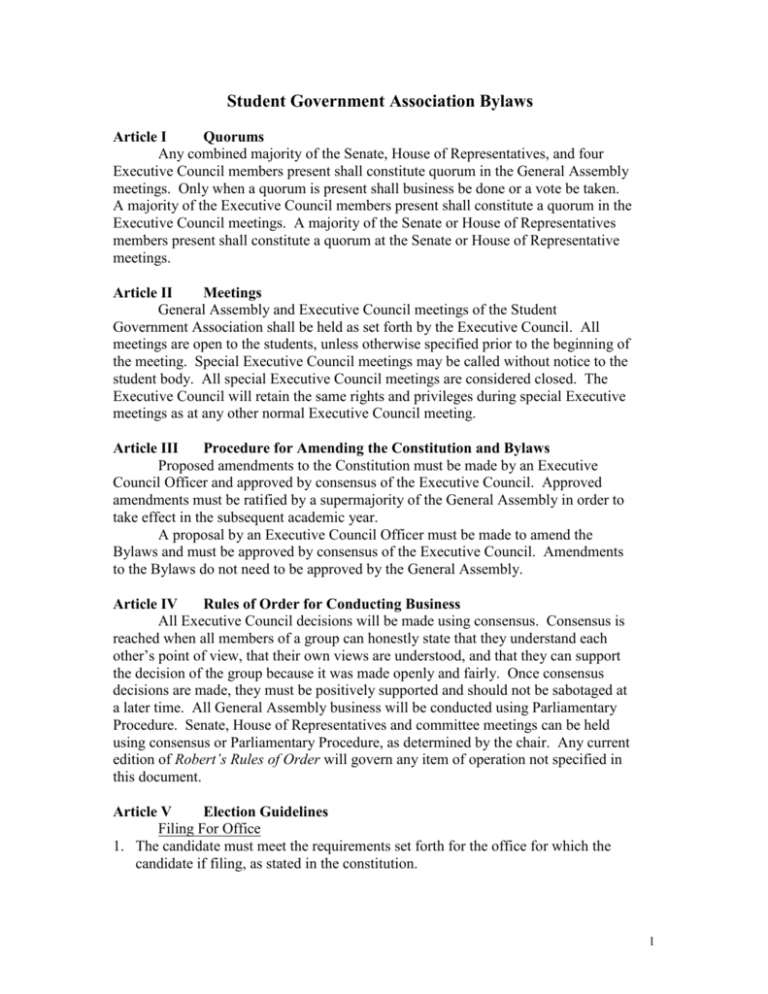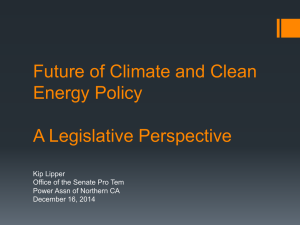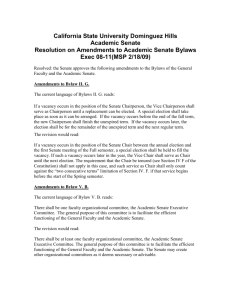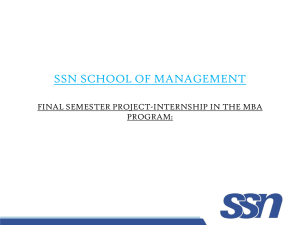Student Government Association Bylaws
advertisement

Student Government Association Bylaws Article I Quorums Any combined majority of the Senate, House of Representatives, and four Executive Council members present shall constitute quorum in the General Assembly meetings. Only when a quorum is present shall business be done or a vote be taken. A majority of the Executive Council members present shall constitute a quorum in the Executive Council meetings. A majority of the Senate or House of Representatives members present shall constitute a quorum at the Senate or House of Representative meetings. Article II Meetings General Assembly and Executive Council meetings of the Student Government Association shall be held as set forth by the Executive Council. All meetings are open to the students, unless otherwise specified prior to the beginning of the meeting. Special Executive Council meetings may be called without notice to the student body. All special Executive Council meetings are considered closed. The Executive Council will retain the same rights and privileges during special Executive meetings as at any other normal Executive Council meeting. Article III Procedure for Amending the Constitution and Bylaws Proposed amendments to the Constitution must be made by an Executive Council Officer and approved by consensus of the Executive Council. Approved amendments must be ratified by a supermajority of the General Assembly in order to take effect in the subsequent academic year. A proposal by an Executive Council Officer must be made to amend the Bylaws and must be approved by consensus of the Executive Council. Amendments to the Bylaws do not need to be approved by the General Assembly. Article IV Rules of Order for Conducting Business All Executive Council decisions will be made using consensus. Consensus is reached when all members of a group can honestly state that they understand each other’s point of view, that their own views are understood, and that they can support the decision of the group because it was made openly and fairly. Once consensus decisions are made, they must be positively supported and should not be sabotaged at a later time. All General Assembly business will be conducted using Parliamentary Procedure. Senate, House of Representatives and committee meetings can be held using consensus or Parliamentary Procedure, as determined by the chair. Any current edition of Robert’s Rules of Order will govern any item of operation not specified in this document. Article V Election Guidelines Filing For Office 1. The candidate must meet the requirements set forth for the office for which the candidate if filing, as stated in the constitution. 1 2. In addition to the requirements stated in the constitution, the candidate must also be currently registered as a student at the time of filing. 3. Filing with the Election Committee for an elected position will be held during a minimum of ten days prior to the election. 4. At the time of requesting an application, each candidate will be given a copy of these Election Guidelines. 5. The candidate may not file for more than one office. However, the candidate may file for a different office in a later term. Election Committee 1. The Executive Officer Election Committee shall be chaired by the highestranking Executive Officer not running for a position. All other members will be those from the Executive Council who are not running for a position. 2. The Senate Elections shall be chaired by the Senate Liaison. Campaigning 1. The campaign period shall be 7 to 14 days prior to the election and run through the last day of the election. 2. Candidates must follow the UIW posting policy during the campaign period. Publicity may not be put out earlier than 6:00a.m. on the first day of campaigning and must be taken down within 24 hours of the last day of campaigning. 3. Candidate debates may be held during the campaign period to give candidates an opportunity to express their views and give students an opportunity to ask questions. 4. An area in the Student Center will be set up to contain a biography of the candidates with their responses to several pertinent student/college related questions. 5. Any violation of the campaign regulations may result in the withdrawal of the candidate from running for office. 6. An expense limit of $250.00 shall be applied to each candidate. 7. Any materials used in the campaign shall be included in the expense, except items provided by the Student Government Office. 8. The Election Committee Chair and the Student Government Advisor may request receipts from candidates during the election. 9. The facilities used during voting shall be considered a safe zone on the days of voting and shall be established by the Election Committee Chair. 10. No campaigning shall be allowed in the safe zone on the days of voting. 11. No person may be written onto the ballot for any office. Election Time Frame 1. The Student Government Association Executive Officers shall be elected in the spring semester of each academic year. The elections shall be held in March or April of the spring semester. 2. The Elected Officers will appoint the remaining Executive Officers during the spring semester. 3. Senate elections shall be held during the first six weeks of the fall semester. 2 4. The time and place for all special elections shall be under the jurisdiction of the Student Government Association President. Voting Procedures 1. Elections will be conducted in a forum which the Executive Council sees fit. 2. Each member of the student body shall have the right to cast one ballot for the candidate(s) of his/her choice. A student must show a valid UIW I. D. card in order to cast a ballot. 3. Voting shall be by secret ballot and conducted over a minimum of two days. 4. The ballots will be counted by personnel appointed by the DUESP and reported to the SGA. 5. The ballots will be counted by the Election Committee Chair, a student (not connected with Student Government) and the Director of the Student Center and Leadership activities. 6. A plurality of those voting shall determine the winners. If two individuals receive the same number of votes, the two candidates will be placed in a run-off election to determine the winner. The run-off election will be held five school days following the general elections. Article VI Appointing Guidelines Filing for Office 1. The candidate must meet the requirements set forth for the office for which the candidate is filing as stated in the constitution. 2. Filing with the Student Government Association Elected Officers for an appointed position will be held after the spring elections. 3. At the time of requesting an application, each candidate will be given a copy of these Appointing Guidelines. Appointing Committee The Appointing Committee shall be chaired by the highest ranking Executive Officer and all other newly elected Executive Council members. Interviewing Each applicant must sign up for an interview with the newly elected Executive Council members upon submitting of application. Selection Selection of an Appointed Officer will be based on selection by the President and Vice President, along with approval by the senate. Applicants will be notified no later than 2 weeks or 10 working days after their interview. 3 Article VII Vacancies in an Office Section 1. Appointed Offices Appointed positions which are vacant during the term of office shall be appointed by the President and Vice President, along with approval by the Senate. Section 2. Elected Offices The process of consensus by the Executive Council shall be used to fill any vacancies that may arise. A vacancy in an elected office at any time during the term of office, other than the office of President, will be filled by appointment by the Executive Council according to the Appointing Guidelines in Article VI of the Student Government Association Bylaws. If the office of President should become vacant at anytime, the Vice President would move to the President’s position, unless the Vice President was appointed rather than elected. If the Vice President were appointed, he/she would hold the President’s position temporarily until the Executive Council decides to hold an election or appoint a current Executive Council Officer to fill the position of President. Section 3. Senate Offices Any vacancy that may arise among the Senate during the term of office will be filled by appointment by the Executive Council according to the Appointing Guidelines in Article VI of the Student Government Association Bylaws. Selection will be based on consensus of the Executive Council. Article VIII Committees Special committees will be created as deemed necessary by the consensus of the Executive Council, to carry out business of the Executive Council and will be chaired by an Executive Council Officer. The Student Government Association President shall appoint committees and committee chairs to carry out the business of the General Assembly, as needed. Article IX Allocation Policy Funding for events, activities, programs, educational trips, and speakers, is approved through an Allocation Request to the Student Government Association. The purpose of this allocation is to provide financial support for educational purposes, community service, benefiting another organization or service, and activities for registered student organizations that might not be available otherwise. The following mandatory guidelines serve to assist organizations in planning their requests and to assist Student Government Association members in voting on their requests: A. Allocation Guidelines 1. The UESP must approve the Request for Activity Approval Form, before funds are requested. 2. All fund requests must be received 2 weeks, or 10 working days prior to the event. No fund request will be considered if received by the Student Government Association after the event has taken place. 3. The allocation must be spent within the semester requested unless approved by the Executive Council. 4. There will only be one allocation per organization per semester (fall and 4 spring) as funds are available. 5. Funds are transferred to the organizations on-campus account. If the organization does not have an on-campus account, the allocation must be paid directly to the vendor. 6. Allocation evaluation shall include the following criteria: a) the organization’s demonstrated involvement and commitment to the University of the Incarnate Word. b) The purpose and quality of the proposed event. c) The organization’s involvement with Student Government events as well as general assemblies. The organization may be absent from no more than four General Assemblies a year or two General Assemblies consecutively. d) Funds that are allocated may not be used for the purchase of any kind of alcohol. 9. The Senate, Senators, and House of Representatives can also receive an allocation (following the same procedures as other organizations) based on their involvement and the quality of the proposed program(s). 10. Allocations will be awarded, as funds are available. B. Allocation Process Considerations of an allocation request involves the following steps: 1. The student organization must submit a Request for Approval of Activity form to the Director of the Student Center and Leadership Activities. The approval process for the activity must be completed before requesting funds. 2. The organization obtains an Allocation Request form from the Student Government Association Treasurer in the Student Government Association Office. 3. An allocation form should be completed with careful documentation about how the money will be spent. The form must be submitted to the Student Government Association office no later than 2 weeks, or 10 working days prior to the event. 4. The Student Government Association Executive Officers will review the request to determine if the proposed activity falls within the funding policy guidelines listed above. If the Executive Officers have any questions or recommendations, a member of the respective organization will be asked to meet with Executive officers to discuss the requested allocation. 5. The Treasurer must notify the organization within 10 working days of their approval or denial. 6. If the funding is not approved, amendments to the funding request may be considered. 7. After approval, the organization is responsible for arranging appropriate methods of fund disbursement with the UESP and the Treasurer of the Student Government. 5 8. It should be noted that any organization receiving allocations must provide the UIW Business Office with receipts no more than ten working days after the event or purchase. If receipts do not add up to the amount allocated then the organization must pay back the difference within ten days of returning the receipts. C. Sanctions 1. In the event that these guidelines are not met, the following “After-Action” sanctions shall be implemented to the discretion of the Executive Council. Probation—The organization may not apply for allocation for the duration of the following semester. At the end of the probation the organization will be reviewed. Suspension- The organization’s voting rights shall be suspended for the duration following of the semester. At the end of the suspension the organization will be reviewed. Review of Registration—The organization shall be placed on probation and the Student Government may review the rights of the organization to register for the next semester. 2. The Parliamentarian will have to submit the approved sanctions to the organization, in writing within 10 working days of approval . 3. It should be noted that the absence of the vote of any suspended organizations shall not affect the ability to meet quorum. D. Appeals and Review Registration Committee If any organization would like to appeal the decision of the Executive Council they may petition in writing to the Director of the Student Center/Leadership Activities within 10 working days of being notified of their sanctions. The Director of the Student Center/Leadership Activities will call the Appeal and Review Registration Committee into action. 1. The chairperson will be the UESP. The chairperson of this committee will not have a vote unless there is a tie between the members. 2. This committee will have a chairperson, the Student Organization Coordinator, an SGA officer, House Chairperson and the Senate Chairperson. a) The chairperson will read the sanction to all members of the committee. b) An officer from the Executive Council and the Organization in question should be present. c) Each representative shall be allowed eight minutes to present their contention. d) The committee shall cross examine each representative after their speech for three minutes. e) After cross examination the chairperson will allow three minutes for rebuttal to each representative. 6 f) The committee chairperson may allocate more time to each representative if requested by the representative and approved by the committee. The Appeals and Review Registration Committee will have the duty to agree with the Student Government Executive Council or decide on a lesser sanctions. 3. Article X Officer and Senate Compensation The following guidelines will be used to compensate* the Executive Council in regards to their service to the UIW Student Body 1. President a. Summer, Fall, and Spring b. Room and Board c. $5250 Stipend i. $25/hour, 5 hr/wk, 12 wk, 15 wk fall, 15 wk spring 2. Vice President a. Summer, Fall, and Spring b. Room and Board c. $5250 Stipend i. $25/hour, 5 hr/wk, 12 wk, 15 wk fall, 15 wk spring 3. Chief of Staff a. Fall and Spring b. $3000 Stipend i. $20/hour, 5hr/wk, 15 wk fall, 15 wk spring 4. Treasurer a. Fall and Spring b. $3000 Stipend i. $20/hour, 5hr/wk, 15 wk fall, 15 wk spring 5. Attorney General a. Fall and Spring b. $3000 Stipend i. $20/hour, 5hr/wk, 15 wk fall, 15 wk spring 6. Parliamentarian a. Fall and Spring b. $3000 Stipend i. $20/hour, 5hr/wk, 15 wk fall, 15 wk spring 7. Secretary a. Fall and Spring b. $3000 Stipend i. $20/hour, 5hr/wk, 15 wk fall, 15 wk spring 8. Webmaster/Public Relations a. Fall and Spring b. $3000 Stipend i. $20/hour, 5hr/wk, 15 wk fall, 15 wk spring 9. Senate a. $500 stipend 7 i. $250 fall, $250 spring 10. Interns (come from Senate) a. Additional $250/semester *As inflation occurs to the U.S. dollar, so too shall pay increase. Every two years pay shall be adjusted to inflation (similar to tuition). Article XI Executive Council Interns Do to the fact of recent history (2010 – 2014), the need for retaining talented students who are not elected or appointed to the Executive has arisen. Two of the 2010 interns served as President and Vice President, and one of the 2011 interns served as the Student Concerns Officer. Due to this fact, Interns shall become an integral part of cultivating talented student-leaders at UIW. The following guidelines will outline the intern process; 1) Interns must serve in the Senate one semester prior to becoming an Intern, and continue serving in the Senate once chosen. 2) 1-2 senators can serve as Executive Council interns at any one moment 3) Chosen interns will be compensated with an extra $250 ($125/semester) in addition to the Senate stipend. 4) The President shall select interns with the advice of the Executive Council. 5) Inters will essentially function as an active EC member without voting rights concerning consensus. Attending EC meetings, and retreats if deemed necessary by the President and DUESP. Article XII Graduate Student Participation Graduate students can hold any office in the Student Government Association. 8








